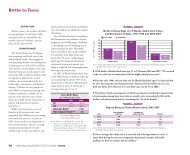2010 Rhode Island Kids Count Factbook
2010 Rhode Island Kids Count Factbook
2010 Rhode Island Kids Count Factbook
Create successful ePaper yourself
Turn your PDF publications into a flip-book with our unique Google optimized e-Paper software.
50<br />
Children Participating in School Breakfast<br />
DEFINITION<br />
Children participating in school<br />
breakfast is the percentage of lowincome<br />
children who participate in the<br />
School Breakfast Program. Children are<br />
counted as low-income if they are<br />
eligible for and enrolled in the Free or<br />
Reduced-Price Lunch Program.<br />
SIGNIFICANCE<br />
The School Breakfast program is a key<br />
component of eliminating child hunger,<br />
and it has been proven to improve<br />
children’s health, school attendance and<br />
behavior. 1 School Breakfast Programs<br />
offer nutritious meals, and participating<br />
children are more likely to meet their<br />
Recommended Daily Allowances of<br />
four key nutrients. 2 Students who<br />
participate in school breakfast programs<br />
have higher standardized test scores,<br />
fewer absences, reduced tardiness, better<br />
behavior and lower risks of obesity. 3<br />
Food-insecure families often do not<br />
have sufficient food to provide nutritious<br />
breakfasts to their children every<br />
morning, and children in these families<br />
are at risk of falling behind their peers<br />
physically, cognitively, academically,<br />
emotionally and socially. 4,5 Children who<br />
suffer from undernutrition or food<br />
insecurity are more likely than their peers<br />
to have poor health, be absent from<br />
school, show aggression and anxiety,<br />
suffer from childhood obesity and need<br />
special education services. 6,7 Nationally,<br />
0<br />
kindergarteners in households<br />
experiencing food insecurity missed, on<br />
average, two days more of school each<br />
year than their peers in food-secure<br />
households. 8 Risk factors for food<br />
insecurity in <strong>Rhode</strong> <strong>Island</strong> include being<br />
Hispanic, having children under the age<br />
of six, being a single parent, and not<br />
finishing high school. 9<br />
<strong>Rhode</strong> <strong>Island</strong> state law requires all<br />
public schools to provide students with<br />
access to school breakfast, although<br />
higher-income parents may be required<br />
to pay for some share of the costs.<br />
<strong>Rhode</strong> <strong>Island</strong> also receives over $5.4<br />
million in federal funds for the School<br />
Breakfast Program, which flows directly<br />
into the state’s economy. 10<br />
If <strong>Rhode</strong> <strong>Island</strong> increased low-income<br />
student participation in the School<br />
Breakfast Program from 40% to 60% of<br />
School Lunch Program participation rates,<br />
the state would receive more than $2.4<br />
million in additional federal funds to<br />
support the School Breakfast Program. 11<br />
During the 2008-2009 school year, 39<br />
low-income students participated in the<br />
School Breakfast Program for every 100<br />
low-income students that participated in<br />
the School Lunch Program. <strong>Rhode</strong> <strong>Island</strong><br />
ranks 41st in the country for<br />
participation in the School Breakfast<br />
Program when participation is analyzed<br />
as the ratio of low-income students in the<br />
School Breakfast Program to low-income<br />
students in the School Lunch Program,<br />
down from 37th last year. 12<br />
70<br />
60<br />
40<br />
30<br />
20<br />
10<br />
Low-Income Children Participating in the School Breakfast Program,<br />
<strong>Rhode</strong> <strong>Island</strong>, October 2009<br />
<strong>Rhode</strong> <strong>Island</strong><br />
RI Schools<br />
Without Universal<br />
School Breakfast<br />
RI Schools<br />
With Universal<br />
School Breakfast*<br />
19%<br />
27%<br />
31%<br />
0% 10% 20% 30% 40% 50% 60% 70% 80% 90% 100%<br />
* Includes all schools in Central Falls, Cranston, Pawtucket, Providence and Woonsocket that offer<br />
universal breakfast throughout the district, as well as selected schools in East Providence.<br />
Source: <strong>Rhode</strong> <strong>Rhode</strong> <strong>Island</strong> Department of Elementary and Secondary Education, Office of School Food Services, Office<br />
of Finance and Office of Network & Information Systems, October 2009.<br />
◆ In 2009, the percentage of low-income students participating in School Breakfast<br />
Programs in schools offering universal school breakfast was 31% compared with 19% of<br />
students participating in non-universal programs in the remainder of the state. 13<br />
◆ Universal School Breakfast Programs, which provide free breakfast to all children<br />
regardless of income, increase school breakfast participation and can reduce<br />
administrative costs. When schools offer breakfast in the classroom at the start of the<br />
school day, participation rates increase even more. 14<br />
◆ During the 2009-<strong>2010</strong> school year, 16 school districts in <strong>Rhode</strong> <strong>Island</strong> with severeneed<br />
schools (schools in which 40% or more of students qualify for free or reduced price<br />
schools meals) did not offer universal school breakfast. 15 Data show that universal<br />
classroom breakfast programs are key to increasing school breakfast participation among<br />
low-income students, especially in severe-needs schools. 16<br />
◆ Each day a low-income student does not participate in the School Breakfast Program<br />
in a severe-needs school, the district loses $1.68 in federal nutrition funding for each<br />
student who would have received a free breakfast and $1.38 for each student who would<br />
have received a reduced-price breakfast. 17<br />
48 <strong>2010</strong> <strong>Rhode</strong> <strong>Island</strong> KIDS COUNT <strong>Factbook</strong> / Economic Well-Being






